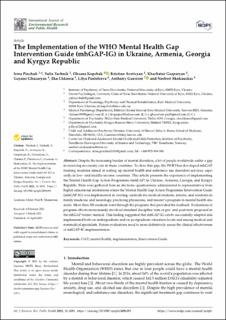| dc.contributor.author | Pinchuk, Irina | |
| dc.contributor.author | Yachnik, Yulia | |
| dc.contributor.author | Kopchak, Oksana | |
| dc.contributor.author | Avetisyan, Kristine | |
| dc.contributor.author | Gasparyan, Khachatur | |
| dc.contributor.author | Ghazaryan, Gayane | |
| dc.contributor.author | Chkonia, Eka | |
| dc.contributor.author | Panteleeva, Lilya | |
| dc.contributor.author | Guerrero, Anthony | |
| dc.contributor.author | Skokauskas, Norbert | |
| dc.date.accessioned | 2022-09-30T09:20:48Z | |
| dc.date.available | 2022-09-30T09:20:48Z | |
| dc.date.created | 2021-08-18T13:18:04Z | |
| dc.date.issued | 2021 | |
| dc.identifier.citation | International Journal of Environmental Research and Public Health (IJERPH). 2021, 18 (9), 1-13. | en_US |
| dc.identifier.issn | 1661-7827 | |
| dc.identifier.uri | https://hdl.handle.net/11250/3022798 | |
| dc.description.abstract | Despite the increasing burden of mental disorders, a lot of people worldwide suffer a gap in receiving necessary care in these countries. To close this gap, the WHO has developed mhGAP training modules aimed at scaling up mental health and substance use disorders services, especially in low- and middle-income countries. This article presents the experience of implementing the Mental Health Gap Action Programme (mhGAP) in Ukraine, Armenia, Georgia, and Kyrgyz Republic. Data were gathered from an electronic questionnaire administered to representatives from higher educational institutions where the Mental Health Gap Action Programme Intervention Guide (mhGAP-IG) was implemented in existing curricula for medical students, interns, and residents in family medicine and neurology, practicing physicians, and master’s program in mental health students. More than 700 students went through the programs that provided the feedback. Evaluations of program effectiveness mainly involved standard discipline tests or pre- and post-tests proposed in the mhGAP trainer manual. This finding suggested that mhGAP-IG can be successfully adapted and implemented both on undergraduate and on postgraduate education levels and among medical and nonmedical specialists. Future evaluations need to more definitively assess the clinical effectiveness of mhGAP-IG implementation. | en_US |
| dc.language.iso | eng | en_US |
| dc.publisher | MDPI | en_US |
| dc.rights | Navngivelse 4.0 Internasjonal | * |
| dc.rights.uri | http://creativecommons.org/licenses/by/4.0/deed.no | * |
| dc.title | The Implementation of the WHO Mental Health Gap Intervention Guide (mhGAP-IG) in Ukraine, Armenia, Georgia and Kyrgyz Republic | en_US |
| dc.title.alternative | The Implementation of the WHO Mental Health Gap Intervention Guide (mhGAP-IG) in Ukraine, Armenia, Georgia and Kyrgyz Republic | en_US |
| dc.type | Peer reviewed | en_US |
| dc.type | Journal article | en_US |
| dc.description.version | publishedVersion | en_US |
| dc.source.pagenumber | 1-13 | en_US |
| dc.source.volume | 18 | en_US |
| dc.source.journal | International Journal of Environmental Research and Public Health (IJERPH) | en_US |
| dc.source.issue | 9 | en_US |
| dc.identifier.doi | 10.3390/ijerph18094391 | |
| dc.identifier.cristin | 1926958 | |
| cristin.ispublished | true | |
| cristin.fulltext | original | |
| cristin.qualitycode | 1 | |

